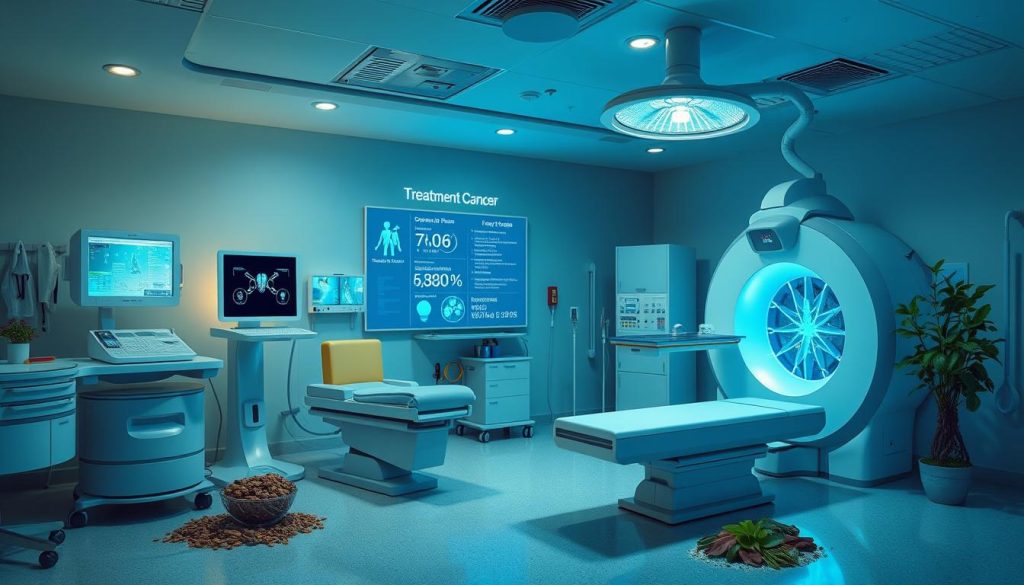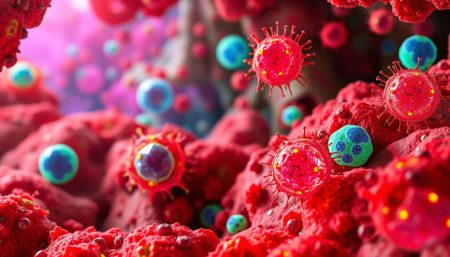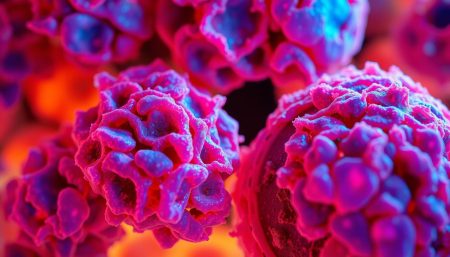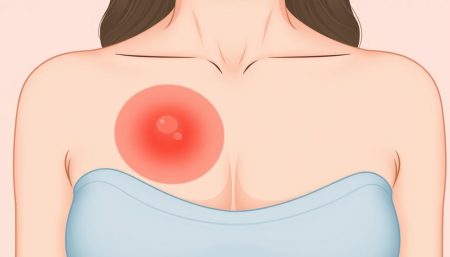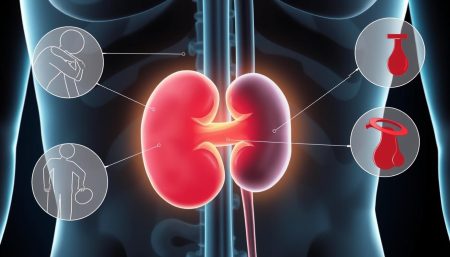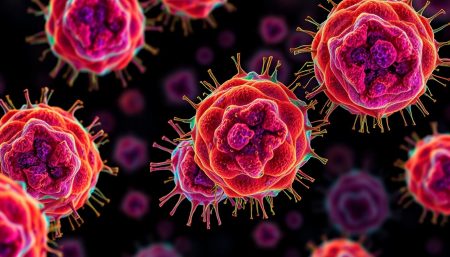Getting a prostate cancer diagnosis can feel scary. This guide aims to help you understand the ways to treat and possibly cure prostate cancer. We’ll look at both new medical treatments and alternative therapies available today.
Learning how to cure prostate cancer begins with knowing your options. We’ll cover traditional treatments like surgery and radiation. We’ll also talk about newer technologies that might offer better results. Our aim is to give you the knowledge to make the best choices for your treatment.
Whether you’re looking at medical treatments or natural options, this guide is here to help. It’s designed to guide you through the complex world of prostate cancer care. Let’s start this journey to healing and hope together.
Understanding Prostate Cancer: Types and Stages
Prostate cancer is a complex disease with different types and stages. Knowing these differences helps patients and their families make better treatment choices.
Early-Stage vs. Advanced Prostate Cancer
Early-stage prostate cancer stays in the prostate gland. It grows slowly and might not need treatment right away. Advanced prostate cancer has spread, needing more serious treatments.
Gleason Score and Cancer Grading
The Gleason score grades prostate cancer’s aggressiveness. It ranges from 6 to 10, with higher scores meaning more aggressive cancer. This score helps doctors choose the best treatment for each patient.
Common Symptoms and Warning Signs
Early prostate cancer often has no symptoms. But as it grows, men might notice:
- Frequent urination, especially at night
- Difficulty starting or stopping urination
- Weak or interrupted urine flow
- Blood in urine or semen
- Erectile dysfunction
Knowing about prostate cancer stages is key for good treatment planning. If you see any of these symptoms, see your doctor right away for the right care.
How to Cure Prostate Cancer: Medical Treatment Options
There are many ways to treat prostate cancer, each one chosen based on the patient’s needs. The right treatment depends on the cancer’s stage, the patient’s health, and what they prefer.
Surgery and Surgical Approaches
Surgery is a common treatment for prostate cancer. Radical prostatectomy means removing the prostate gland and nearby tissues. Robotic-assisted surgeries are more precise and help patients recover faster.
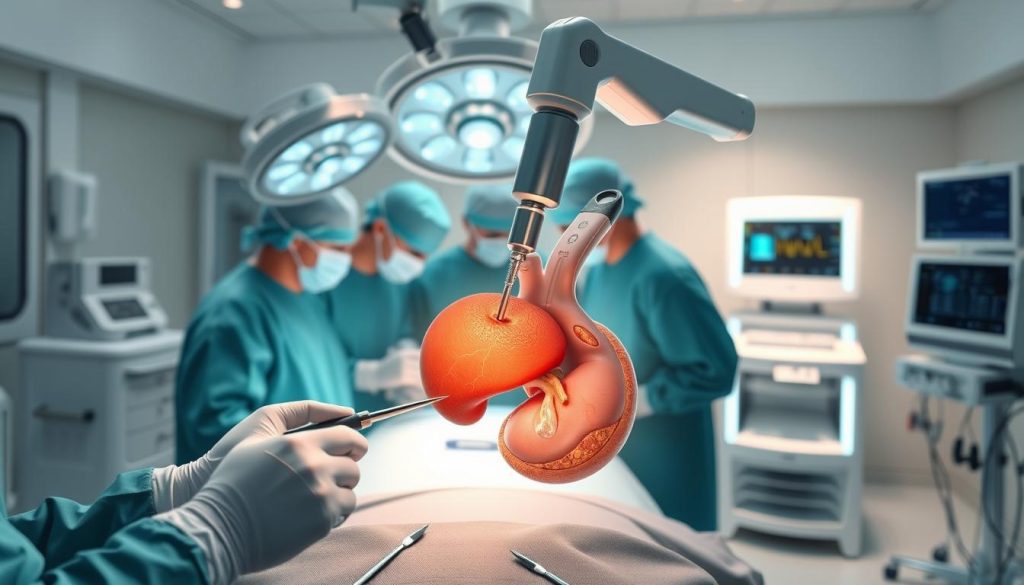
Radiation Therapy Methods
Radiation therapy kills cancer cells with high-energy rays. External beam radiation comes from outside the body. Brachytherapy places radioactive seeds inside the prostate.
| Treatment | Duration | Side Effects |
|---|---|---|
| External Beam Radiation | 5-8 weeks | Fatigue, urinary issues |
| Brachytherapy | 1-2 sessions | Temporary discomfort, urinary symptoms |
Hormone Therapy Treatments
Hormone therapy lowers testosterone levels to slow cancer growth. It can be used alone or with other treatments. Common methods include medication and removing testicles surgically.
Chemotherapy Protocols
Chemotherapy uses drugs to kill cancer cells everywhere in the body. It’s mainly for advanced cases or when other treatments fail. Treatment plans vary but often include several cycles over months.
“Advances in medical treatments have significantly improved prostate cancer outcomes. Each option offers unique benefits and potential side effects, making personalized treatment plans crucial.”
Advanced Treatment Technologies and Innovations
The world of prostate cancer treatment is changing fast. New technologies and therapies are making treatments better. This brings hope to those looking for a cure.
Immunotherapy is a big hope. It uses the body’s immune system to fight cancer. Early trials show it’s working well, especially for advanced cases.
Targeted drug therapies are another big step. These drugs hit cancer cells right where it hurts. They might be less harsh than old treatments.
Precision medicine is changing how we treat prostate cancer. It makes treatments fit each patient’s needs. This could lead to better results.
“The future of prostate cancer treatment lies in personalized care. By understanding each patient’s unique genetic makeup, we can offer more targeted and effective therapies.”
Scientists are also looking into new ways to treat cancer. Like proton beam therapy and focal therapies. These aim to harm cancer cells less while still fighting the disease.
| Treatment | Description | Potential Benefits |
|---|---|---|
| Immunotherapy | Stimulates immune system to fight cancer | Less side effects, potential for long-term remission |
| Targeted Drug Therapy | Attacks specific cancer cell vulnerabilities | More precise treatment, reduced toxicity |
| Precision Medicine | Tailored treatment based on genetic profile | Personalized care, improved efficacy |
| Proton Beam Therapy | Uses protons to target tumors | Reduced damage to surrounding tissues |
These new treatments give hope to patients and their families. As research keeps going, we’re getting closer to better treatments and maybe even a cure.
Natural and Alternative Treatment Approaches
Many people look into natural remedies for prostate cancer along with traditional treatments. These options can add to medical care, making people feel better overall.
Diet Modifications and Nutritional Support
A diet for prostate cancer often includes more plant-based foods. Eating fruits, vegetables, and whole grains can help manage symptoms and improve health. Tomatoes, full of lycopene, might even slow cancer growth, some studies say.
Herbal Supplements and Traditional Medicine
Some herbs might help support prostate health. Green tea extract and saw palmetto are favorites. But, it’s important to talk to a doctor before taking any supplements. They can affect how medicines work.
| Herb | Potential Benefit | Precautions |
|---|---|---|
| Green Tea Extract | Antioxidant properties | May interfere with blood thinners |
| Saw Palmetto | May reduce urinary symptoms | Can cause digestive issues |
| Pomegranate Extract | Potential to slow PSA doubling time | Possible drug interactions |
Mind-Body Therapies
Reducing stress is important in fighting cancer. Yoga, meditation, and tai chi can calm the mind and improve life quality. They might also help sleep better and fight fatigue from treatments.
“Integrating mind-body therapies into my treatment plan helped me feel more in control and optimistic about my journey with prostate cancer.”
When trying natural and alternative methods, always work with your healthcare team. This ensures safe and effective care.
Lifestyle Changes for Cancer Management
Making smart lifestyle choices can play a big role in managing prostate cancer. Let’s explore some key areas where you can take action to support your health journey.
Exercise and Physical Activity Guidelines
Regular exercise is crucial for those dealing with prostate cancer. Aim for 30 minutes of moderate activity most days of the week. This could include brisk walking, swimming, or cycling. Always check with your doctor before starting any new exercise program.
Physical activity can help reduce fatigue, improve mood, and boost overall well-being.
Stress Management Techniques
Coping with prostate cancer can be stressful. Try relaxation methods like deep breathing, meditation, or yoga. These practices can lower anxiety and improve your quality of life.
Some men find lifestyle changes for prostate cancer management helpful in reducing stress. Joining a support group or talking to a counselor can provide emotional support.
Sleep and Recovery Optimization
Good sleep is vital for healing and recovery. Aim for 7-9 hours of sleep each night. Create a relaxing bedtime routine and keep your bedroom cool and dark.
If sleep problems persist, talk to your healthcare team. They might suggest adjustments to your prostate cancer diet or other strategies to improve your rest. Remember, taking care of your body through these lifestyle changes can complement your medical treatment and boost your overall health.
FAQ
Q: What are the main treatment options for prostate cancer?
A: Treatments for prostate cancer include surgery, radiation, hormone therapy, and chemotherapy. New treatments like immunotherapy and targeted drugs are also available. The best choice depends on the cancer’s stage and the patient’s health.
Q: How is early-stage prostate cancer different from advanced prostate cancer?
A: Early-stage cancer is usually slow-growing and stays in the prostate. Advanced cancer has spread and needs stronger treatments.
Q: What is the Gleason Score and why is it important?
A: The Gleason Score shows how aggressive prostate cancer is. It ranges from 6 to 10, with higher scores meaning more aggressive cancer. This score helps doctors choose the best treatment and predict the cancer’s behavior.
Q: Are there natural remedies that can help in treating prostate cancer?
A: Natural remedies can support health during treatment but shouldn’t replace standard treatments. They include dietary changes, herbal supplements, and mind-body therapies. Always talk to your doctor before trying alternative therapies.
Q: How important is diet in managing prostate cancer?
A: Diet is very important in managing prostate cancer. Eating fruits, vegetables, whole grains, and lean proteins helps. Avoiding red meat and processed foods is also good. Some foods, like tomatoes and cruciferous vegetables, may help fight cancer.
Q: What lifestyle changes can help during prostate cancer treatment?
A: Lifestyle changes like regular exercise, stress management, good sleep, and a healthy diet are key. These can improve your quality of life and help treatments work better.
Q: What are the latest advancements in prostate cancer treatment?
A: New treatments include precision medicine, immunotherapy, and targeted drugs. Robotic surgeries have also improved. Research in gene therapy and nanotechnology is promising for future treatments.
Q: How effective is radiation therapy for treating prostate cancer?
A: Radiation therapy is very effective, especially for early-stage cancer. It can be used alone or with other treatments. Modern techniques like IMRT and proton beam therapy are more precise and have fewer side effects.
Q: What role does hormone therapy play in prostate cancer treatment?
A: Hormone therapy, or androgen deprivation therapy, is crucial in treating prostate cancer. It lowers male hormones that cancer needs to grow. It’s often used with other treatments or for cancer that has spread.
Q: Can prostate cancer be cured completely?
A: While “cure” is complex in cancer, many men can achieve long-term remission. Early detection and proper treatment improve outcomes. Even in advanced cases, new therapies are helping to extend life and improve quality of life.












